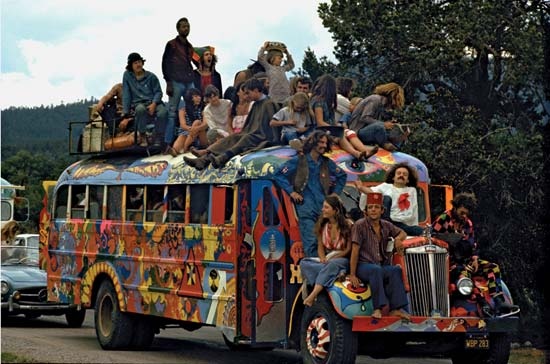hippie
subculture
also spelled hippy
 member, during the 1960s and 1970s, of a countercultural movement that rejected the mores of mainstream American life. The movement originated on college campuses in the United States, although it spread to other countries, including Canada and Britain. The name derived from “hip,” a term applied to the Beats (Beat movement) of the 1950s, such as Allen Ginsberg and Jack Kerouac, who were generally considered to be the precursors of hippies. Although the movement arose in part as opposition to U.S. involvement in the Vietnam War (1955–75), hippies were often not directly engaged in politics, as opposed to their activist counterparts known as “Yippies” (Youth International Party).
member, during the 1960s and 1970s, of a countercultural movement that rejected the mores of mainstream American life. The movement originated on college campuses in the United States, although it spread to other countries, including Canada and Britain. The name derived from “hip,” a term applied to the Beats (Beat movement) of the 1950s, such as Allen Ginsberg and Jack Kerouac, who were generally considered to be the precursors of hippies. Although the movement arose in part as opposition to U.S. involvement in the Vietnam War (1955–75), hippies were often not directly engaged in politics, as opposed to their activist counterparts known as “Yippies” (Youth International Party).Hippies felt alienated from middle-class society, which they saw as dominated by materialism and repression, and they developed their own distinctive lifestyle. They favoured long hair and casual, often unconventional, dress, sometimes in “psychedelic” colours. Many males grew beards, and both men and women wore sandals and beads. Long, flowing granny dresses were popular with women, and rimless granny glasses with both men and women. Hippies commonly took up communal or cooperative living arrangements, and they often adopted vegetarian diets based on unprocessed foods and practiced holistic medicine. For many The Whole Earth Catalog, which first appeared in 1968, became a source for the necessities of life. Hippies tended to be dropouts from society, forgoing regular jobs and careers, although some developed small businesses that catered to other hippies.
Hippies advocated nonviolence and love, a popular phrase being “Make love, not war,” for which they were sometimes called “flower children.” They promoted openness and tolerance as alternatives to the restrictions and regimentation they saw in middle-class society. Hippies often practiced open sexual relationships and lived in various types of family groups. They commonly sought spiritual guidance from sources outside the Judeo-Christian tradition, particularly Buddhism and other Eastern religions (religion), and sometimes in various combinations. Astrology was popular, and the period was often referred to as the Age of Aquarius. Hippies promoted the recreational use of hallucinogenic drugs (hallucinogen), particularly marijuana and LSD (lysergic acid diethylamide), in so-called head trips, justifying the practice as a way of expanding consciousness.
Both folk (folk music) and rock music were an integral part of hippie culture. Singers such as Bob Dylan and Joan Baez and groups such as the Beatles, Grateful Dead, Jefferson Airplane, and Rolling Stones were among those most closely identified with the movement. The musical Hair, a celebration of the hippie lifestyle, opened on Broadway in 1968, and the film Easy Rider, which reflected hippie values and aesthetics, appeared in 1969. The novelist Ken Kesey (Kesey, Ken) was one of the best-known literary spokesmen for the movement, but he became equally famous for the bus tours he made with a group called the Merry Pranksters.
Public gatherings—part music festivals, sometimes protests, often simply excuses for celebrations of life—were an important part of the hippie movement. The first “be-in,” called the Gathering of the Tribes, was held in San Francisco in 1967. A three-day music festival known as Woodstock (Woodstock Music and Art Fair), held in rural New York state in 1969, drew an estimated 400,000–500,000 people and became virtually synonymous with the movement. Hippies participated in a number of teach-ins at colleges and universities in which opposition to the Vietnam War was explained, and they took part in antiwar protests and marches. They joined other protestors in the “moratorium”—a nationwide demonstration—against the war in 1969. They were involved in the development of the environmental movement (conservation). The first Earth Day was held in 1970.
By the mid-1970s the movement had waned, and by the 1980s hippies had given way to a new generation of young people who were intent on making careers for themselves in business and who came to be known as yuppies (young urban professionals). Nonetheless, hippies continued to have an influence on the wider culture, seen, for example, in more relaxed attitudes toward sex, in the new concern for the environment, and in a widespread lessening of formality.
- taj
- Tajik
- Tajikistan
- Tajikistan, flag of
- Tajimi
- Taj Mahal
- Taj Mahal
- Tajong-gyo
- Tajumulco Volcano
- Takahama Kyoshi
- Takahashi Yuichi
- takahe
- Takakkaw Falls
- Takamatsu
- Takamine, Jokichi
- Takamura Kōun
- Takaoka
- Takarazuka
- Takasago
- Takasaki
- Takashimaya Co., Ltd.
- Takasugi Shinsaku
- Takatsuki
- Takayama
- Takebe Katahiro